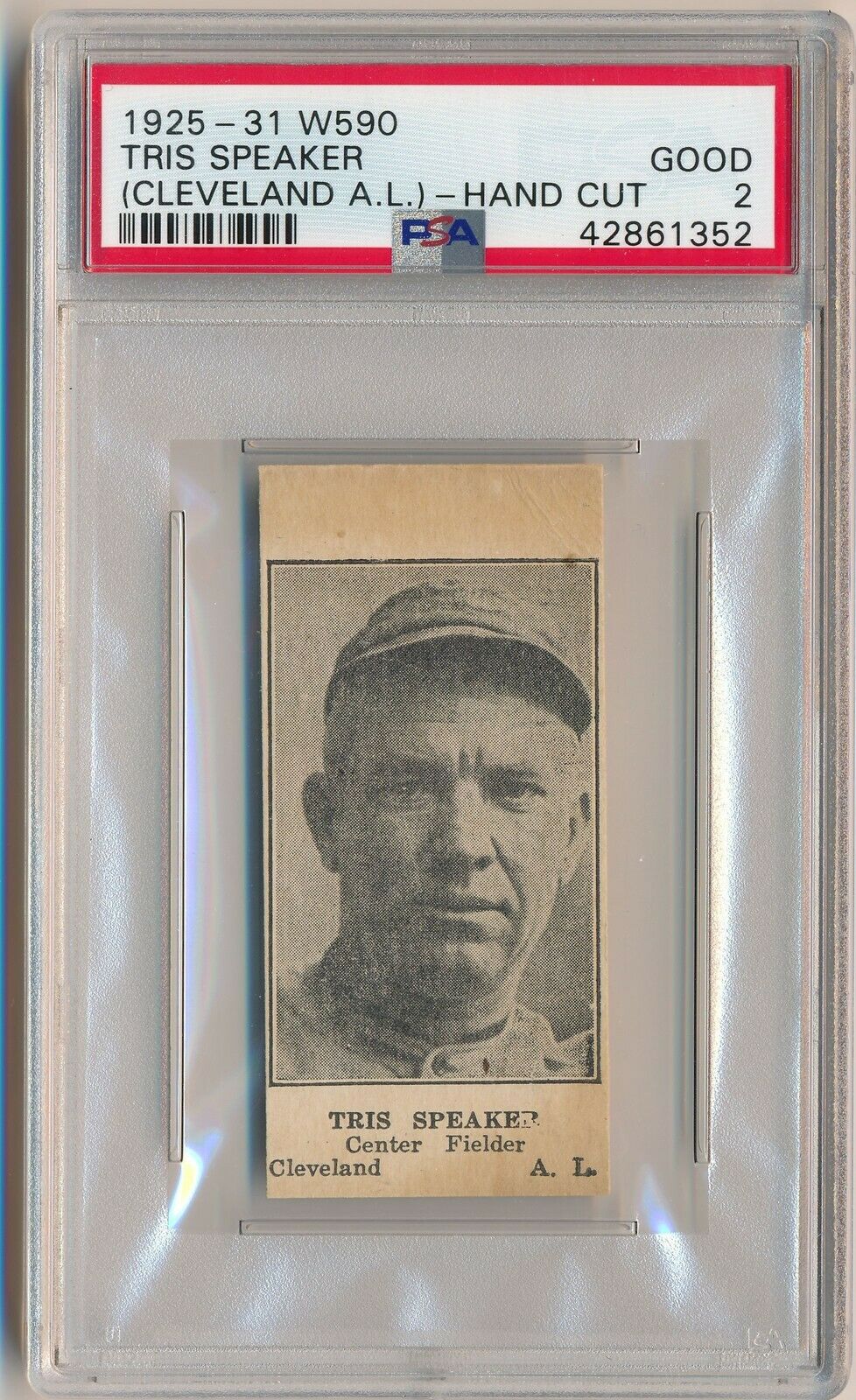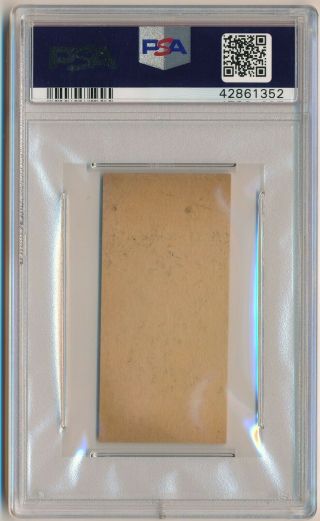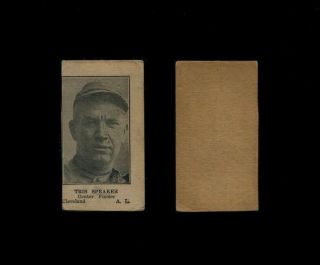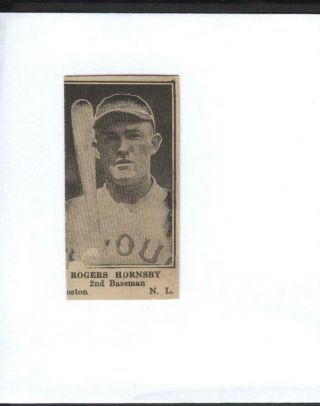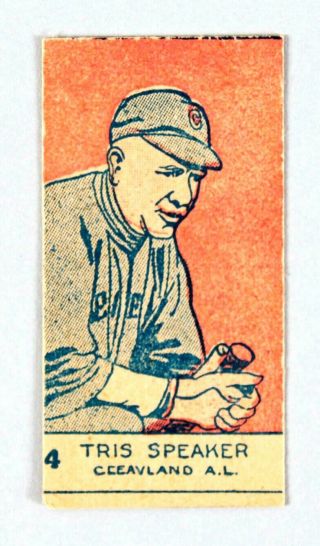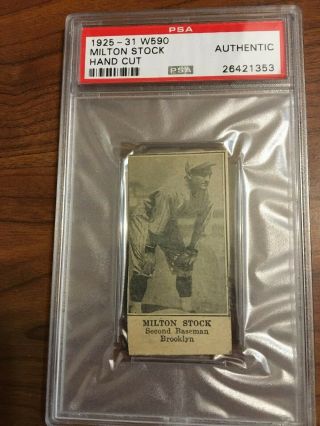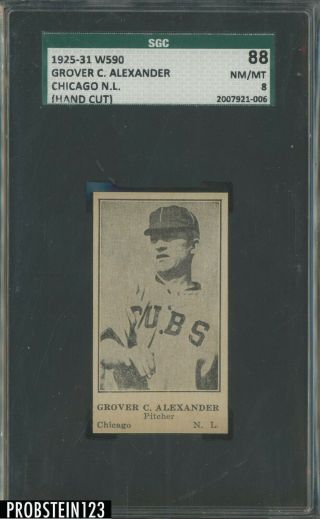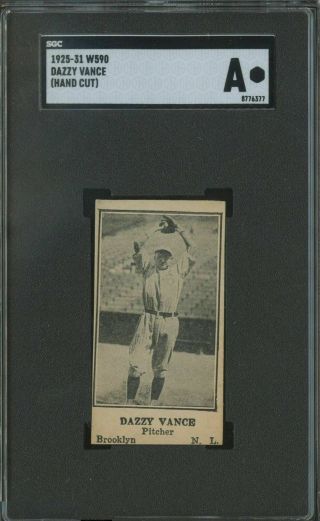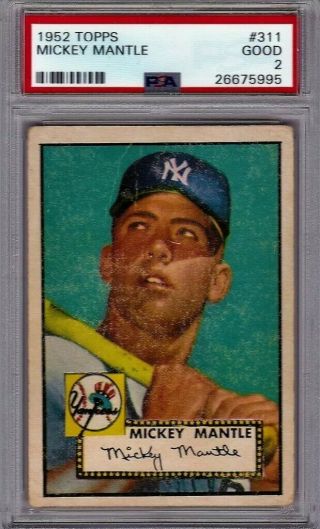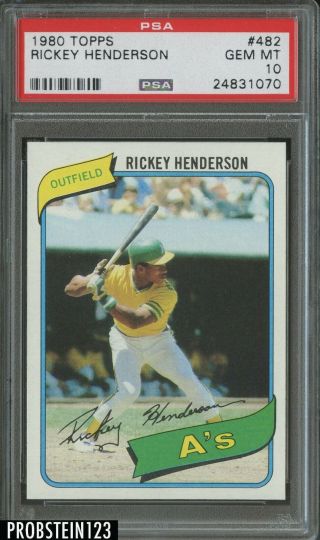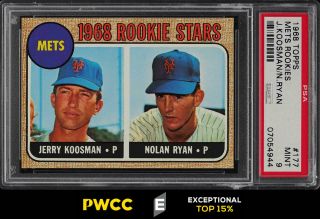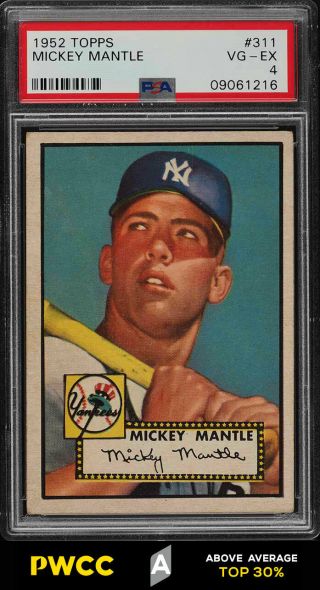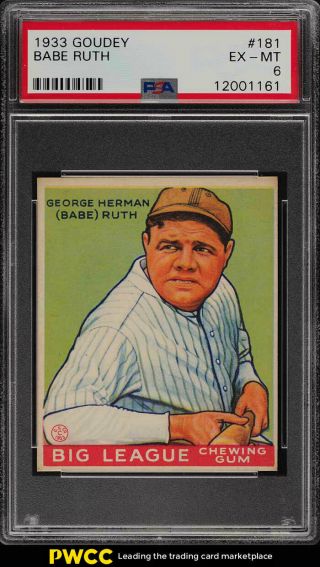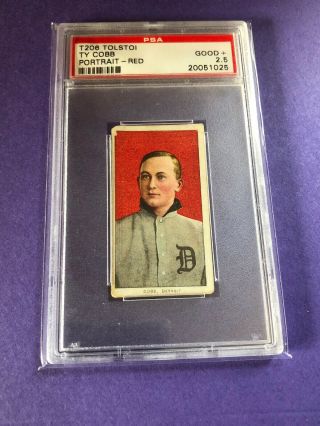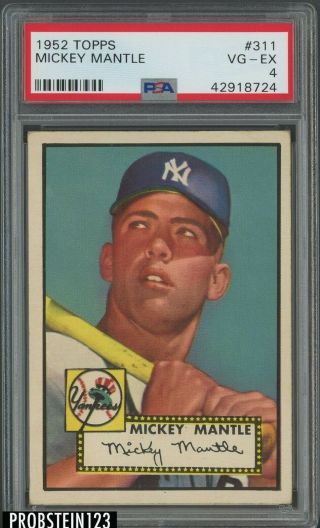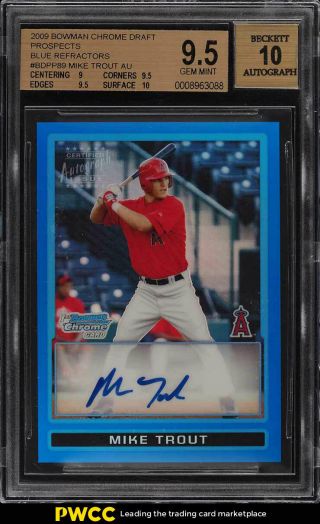TRIS SPEAKER 1925 - 31 W590 Strip Card Hand Cut PSA 2 CLEVELAND HOF RARE LOW POP
Item History & Price
You are bidding on a Professionally Graded TRIS SPEAKER 1925-31 W590 Strip Card Hand Cut PSA 2 CLEVELAND HOF RARE LOW POP. Nice card from a highly sought after prewar vintage set, Thanks for looking and good luck!About Us:
Welcome to iconsportscards. I specialize in vintage sets and factory certified autograph and memorabilia cards from Hall of Fame greats. I pride myself on customer satisfaction, and providing a quality p...roduct at a reasonable price. Best offers are welcome on many of my items, and I'm always happy to help a customer work out a deal, so please do not hesitiate to contact me if you see anything you like from my Ebay Store.Thank you for your time, Chris, iconsportscardsAll sportscard singles ship for one low rate, no matter how many items you buy! Welcome! Please take a moment to view my other items:https://www.ebay.com/str/iconsportscardsShipping and Handling:
Item will be packaged carefully and shipped securely. All graded cards will be secured with rigid cardboard inserts. All non-graded cards will be shipped securely in a penny sleeve and top-loader. All sportscard singles ship for one low rate, no matter how many items you buy! Combined shipping rates on lots may vary. Thanks!Thanks for checking out my auction, and good luck!Tris SpeakerFrom Wikipedia, the free encyclopedia Tris Speaker
Center fielder / ManagerBorn: April 4, 1888
Hubbard, TexasDied: December 8, 1958 (aged 70)
Lake Whitney, TexasBatted: LeftThrew: Left MLB debutSeptember 14, 1907 for the Boston AmericansLast MLB appearanceAugust 30, 1928 for the Philadelpia AthleticsCareer statisticsBatting average .345Hits 3, 514Runs batted in 1, 529TeamsAs Player
Boston Americans/Red Sox (1907-1915)Cleveland Indians (1916-1926)Washington Senators (1927)Philadelpia Athletics (1928)As ManagerCleveland Indians (1919-1926)Career highlights and awardsWorld Series champion: 1912, 1915, 1920Most career doubles (792)Most career outfield assists (449)Fifth highest lifetime major-league batting average (.345)Fifth in career hitsSixth in career triplesEighth in career runsLed American League in batting 1 timeLed American League in slugging percentage 1 timeLed American League in on base percentage 4 timesLed American League in hits 1 timeLed American League in total bases 1 timeLed American League in doubles 8 timesLed American League in home runs 1 timeLed American League outfielders in putouts 7 timesLed American League outfielders in double plays 6 timesLed American League outfielders in assists 3 timesLed American League outfielders in fielding average 2 timesBatted over .380 five timesStruck out only 220 times in 10, 195 at-batsMember of the National Baseball Hall of Fame Induction 1937Vote 82.1% (second ballot)Tristram E. Speaker (April 4, 1888 - December 8, 1958), nicknamed "Spoke" and "The Grey Eagle", was an American baseball player. Considered one of the best offensive and defensive center fielders in the history of Major League Baseball, he compiled a career batting average of .345 (fourth all-time), and still holds the record of 792 career doubles. Defensively, his career records for assists, double plays, and unassisted double plays by an outfielder still stand as well. His fielding glove was known as the place "where triples go to die."[1]Speaker led the Boston Red Sox to two World Series championships, and then carried the Cleveland Indians, as player-manager, to that team's first-ever World Series title. His innovations, most notably the platoon system and the infield rotation play, revolutionized the game. He was inducted into the Baseball Hall of Fame in its second year of voting, 1937. YouthTris Speaker was born on April 4, 1888 in Hubbard, Texas, to Archie and Nancy Poer Speaker. As a youth, he suffered a fractured right arm in a fall from a horse, forcing him to throw left-handed, which he continued to do throughout his baseball career. In 1905, Speaker played his only year of college baseball, for Fort Worth Polytechnic Institute. His left arm was severely injured in a football accident, to the extent that surgeons advised amputation. Tris refused, and fully recovered.Professional careerMinor leaguesSpeaker's abilities drew the interest of Doak Roberts, then owner of the Cleburne Railroaders of the Texas League in 1906. He batted .318 for the Railroaders, and wanted to be a professional ballplayer, but his mother opposed his being “sold into slavery”, stating that she would never give her consent to Tris’ going to Boston, even after he had had success in Houston. Roberts sold the youngster to the Sox for $800 – the Red Sox scout beating the St. Louis Browns by a mere half-hour.Speaker played in seven games for the Red Sox in 1907, with three hits in 19 at bats for a .158 average. The following year, the Red Sox traded Speaker to the Little Rock Travelers of the Southern League in exchange for use of their facilities for spring training in 1908. Speaker ended up batting .350 for the Travelers and his contract was repurchased by the Red Sox, for whom he appeared in 31 games, logging a .224 average.Major League Career1909-12 Duffy Lewis, Tris Speaker and Harry Hooper - Boston's famous "Million-Dollar Outfield". Photo: The Boston Globe archives.Speaker finally won the regular starting center fielder's job in 1909 from the light-hitting Denny Sullivan, who was then sold to the Cleveland Naps. Speaker hit .309 in 143 games as the team finished third in the pennant race.In 1910 the Red Sox signed Duffy Lewis, who became the left fielder, and, with Speaker and Harry Hooper would form Boston’s “Million-Dollar Outfield”, one of the finest outfield trios in baseball history, playing together until Speaker was traded to the Cleveland Indians in 1916.The Boston Red Sox finished second to Connie Mack’s Philadelphia A’s, who were led by their formidable pitching trio of Jack Coombs, Chief Bender and Eddie Plank, the following two years.Speaker’s best season came in 1912, as he played every game, leading the American League in doubles with 53, and home runs with ten. He set career highs with 222 hits, 136 runs, 580 at-bats, and 52 steals, the latter a team record which would stand until Tommy Harper stole 54 bases in 1973. He batted .383, a mark he would surpass three times in his career, but his .567 slugging percentage was the highest of his dead-ball days. Speaker set a major league record when he had three batting streaks of twenty or more games (30, 23, and 22) during the season. The Red Sox won the pennant by finishing 14 games ahead of the Washington Senators and 15 games ahead of the Philadelphia A’s. In the 1912 World Series, Speaker led the Red Sox to their second World Series title over John McGraw's New York Giants, with the Red Sox winning the eighth and final game (game two was called on account of darkness and ended in a tie) after Fred Snodgrass's error—dropping an easy fly ball that would have been the first out—and Fred Merkle's blunder—failing to go after a Speaker pop foul that would have been the second out, after which Speaker promptly singled home the tying run—allowed the Red Sox to tie and win the game in the bottom of the tenth inning. Speaker hit .300 in the Series, with nine hits and four runs scored.1913-15Speaker batted .338 in 1914 and .322 in 1915. The Red Sox beat the Philadelphia Phillies in the World Series, led by 18-game winner and team home run leader with four, pitcher Babe Ruth, in his first full season.Traded to the IndiansAfter the World Series victory, Speaker had a falling-out with Red Sox president J.J. Lannin, who wanted Speaker to take a pay cut from about $15, 000 to about $9, 000 after his average had fallen to .322; Speaker refused. On April 12, 1916 Lannin dealt Speaker to the Cleveland Indians for Sam Jones, Fred Thomas and $50, 000.The angry Speaker held out for $10, 000 of the cash that Boston had got, eventually, with the aid of AL President Ban Johnson, receiving it. Speaker’s contract with Cleveland for $40, 000 was the highest in baseball at the time.Speaker hit over .350 in ten of his eleven years with Cleveland, in 1916 ending Ty Cobb's run of nine consecutive AL batting titles by batting .386 to Cobb’s .371. Speaker's return to Boston, May 9, 1916, was an unofficial tribute by the fans, as over 15, 000 showed up and roared with approval every time he came near the ball. After one half-inning, Speaker started towards the Boston dugout, and the crowd went wild. His return was only spoiled by the Indians' loss of 5-1.On September 1, 1917, in a game against the Tigers in Cleveland, Speaker was hit with the ball as he tried to steal home in the bottom of the first inning. Batter Joe Evans swung away and lined the ball into Speaker's face. Detroit manager Hughie Jennings, as a courtesy, allowed Speaker to sit out the second inning while his face was sewn up. Elmer Smith played center field until Tris returned in the third.As a center fielder, Speaker played so shallow for most hitters that he was like a fifth infielder. Twice in 1914, on April 21 and August 8, he executed an unassisted double play at second base, snaring low line drives on the run and then beating base runners to the bag. He repeated this feat in 1918 with the Indians, on April 18 and April 29, and turned six of them during his career. At least once in his career he was credited as the pivot man in a routine double play. Bill Carrigan, a longtime teammate of Speaker's on the Red Sox, often would send a pickoff throw from his catcher's position to Speaker, who had sneaked in on second base. In addition, as Indians' manager, he insisted the team practice a play where he would come in from center field to cover second on bunt plays, thus freeing his shortstop to cover third, and his third baseman to charge the bunts.Speaker as player-managerFor all intents and purposes, Speaker was assistant manager (and according to some sources, player-manager) of the Indians from the day he arrived; manager Lee Fohl rarely made an important move without consulting Speaker. In Eugene Murdock's Baseball Players and Their Times (ISBN 0-88736-235-4), George Uhle discusses an incident that occurred in his rookie year with the Indians, in 1919:... according to (Cleveland writer) Franklin Lewis, manager Lee Fohl had come to rely heavily on... Speaker for counsel on changing pitchers during a game. If Speaker thought a change would be made he would signal to Fohl in the dugout and also indicate who the replacement would be. In one game in mid-season when things were not going so well, Speaker signaled for a certain pitcher to be brought in from the bullpen. But Fohl misread Speaker's signal and brought in Fritz Coumbe instead of the man Speaker had intended. At first Speaker tried to correct the mistake, but then realized it would look like he was reversing the manager, so he let it pass. It so happened that Coumbe lost the game and that night Fohl resigned as manager and Speaker was named to replace him. Speaker felt bad about the incident because he felt he was the cause of Fohl's departure.In 1973, Uhle remembered the incident, but couldn't be sure whether Speaker was making the changes because he was new to the team at the time. However, he said it reminded him of another Coumbe story:I was sitting on the bench with Guy Morton one day when we were playing the Yankees. Coumbe was near by. Babe Ruth came up and got a hit. 'I know how to pitch to that big monkey, ' Coumbe remarked. Well he was sent to the bullpen to warm up and later got into the game. 'Now we'll see, ' said Morton, 'whether he can pitch to Ruth or not.' Well, Babe knocked the first pitch out of the park. Guy and I both got a big kick out of that and within a day or two, Coumbe was gone just like Fohl.As it turns out, these two events happened in the same game. The Indians played the Red Sox on July 18, 1919. After Cleveland scored four times in the bottom of the eighth to take a 7-3 lead, Boston countered with a run and Coumbe was brought in to face Ruth with the bases loaded, who hit his second homer of the game, as the Sox went on to win, 8-7. The Sporting News reported that Coumbe cried like a baby and Fohl resigned after the game, citing growing criticism from the fans. Speaker was named as his successor. As the Indians had a history of managers quitting mid-season, TSN correspondent Henry P. Edwards stated that, although the resignation was unexpected, the only real surprise would have been if Speaker had not been named player-manager.In 1920, Speaker guided the Indians to their first ever World Series Championship despite the death of Ray Chapman on August 17, after being hit in the head by a pitch from Carl Mays. In what many call the catch that won the pennant for the 1920 Indians, Speaker, his team playing a season-ending game with the Chicago White Sox, caught a screaming line drive hit to deep right-center field by Shoeless Joe Jackson. On the dead run, Speaker leaped with both feet off the ground, snaring the ball before crashing into a concrete wall. As he lay unconscious from the impact, he still had a viselike grip on the ball.Speaker singled off Senators pitcher Tom Zachary on May 17, 1925, to become the fifth member of the 3000 hit club and the second man to reach the historic mark while wearing a Cleveland uniform (Napoleon Lajoie was the first). He managed 1137 games, finishing 617-520, before “retiring” as a manager. This “retirement” was forced by AL President Ban Johnson after a scandal involving gambling broke in 1926, in which Dutch Leonard claimed that Speaker and Ty Cobb fixed at least one Cleveland-Detroit game. Both Speaker and Cobb were forced to “resign” as managers.When Leonard refused to appear at the January 5, 1927 hearings to discuss his accusations, Landis cleared both Speaker and Cobb of any wrongdoing and reinstated both to their original teams, but each team let them know that they were free agents and could sign with whomever they wished. Speaker signed with the Washington Senators for 1927, Cobb with the Philadelphia Athletics. Speaker then joined Cobb in Philadelphia for the 1928 season where he played part-time, finishing with a .267 average.Post professional careerIn 1929 Speaker replaced Walter Johnson as the manager of the Newark Bears of the International League, a post he held for two years. In 1933 he became a part owner of the Kansas City Blues.[2][3] The announcement of Speaker’s election to the Baseball Hall of Fame was made in January 1937. At the time he was in the wholesale liquor business in Cleveland and was chairman of the city’s Boxing Commission.In 1939, Speaker was named as the President of the National Professional Indoor Baseball League. The league had teams in New York, Brooklyn, Philadelphia, Boston, Cleveland, Chicago, Cincinnati and St. Louis. The proposed 102-game schedule was short lived as the league shut down operations after only a month due to lack of fans.Speaker helped found the Cleveland Society for Crippled Children and Camp Cheerful. From 1947 to his death, Speaker was an adviser, coach, and scout for the Indians. In an article in the July 1952 issue of SPORT magazine, Speaker recounted how Bill Veeck hired him to be a coaching consultant to Larry Doby, eventually the second African-American player to cross the baseball color barrier and the American League's first black player. The Indians had signed Doby, the star center fielder of the Newark Eagles of the Negro Leagues, in 1947. A SPORT photograph that accompanied the article shows Speaker mentoring five members of the Indians—Luke Easter, Jim Hegan, Ray Boone, Al Rosen and Doby.Speaker is mentioned in the poem "Line-Up for Yesterday" by Ogden Nash:Line-Up for YesterdayS is for Speaker,
Swift center-field tender,
When the ball saw him coming,
It yelled, "I surrender."— Ogden Nash, Sport magazine (January 1949)[4]Tris Speaker died of a heart attack in Lake Whitney, Texas, at the age of 70. He is buried in Section 1, Block 2 of the Fairview Cemetery, Hubbard, Hill County, Texas.In 2008, Speaker's name was brought up by Marvin Miller, who served as the executive director of the Major League Baseball Players Association from 1966 to 1982, as a player who should be removed from the Hall of Fame because of alleged membership in the Ku Klux Klan. Miller said in an interview with Baseball Prospectus, "Some of the early people inducted in the Hall were members of the Ku Klux Klan: Tris Speaker, Cap Anson, and some people suspect Ty Cobb as well. I think that by and large, the players, and certainly the ones I knew, are good people. But the Hall is full of villains." [5] Noted baseball historian Bill James does not refute this claim, but adds that during the 1920s, the Klan had toned down its racist overtures and pulled in hundreds of thousands of non-racist men, including Hugo Black.[6] James adds that Speaker was a staunch supporter of Larry Doby when he broke the American League color barrier, working long hours with him in the outfield; and Doby mentioned Speaker favorably during his Hall of Fame induction speech.Records and achievementsMost career doubles (792)Most career outfield assists (449)Fifth highest lifetime major-league batting average (.345)Fifth in career hitsSixth in career triplesEighth in career runsLed American League in batting 1 timeLed American League in slugging percentage 1 timeLed American League in on base percentage 4 timesLed American League in hits 1 timeLed American League in total bases 1 timeLed American League in doubles 8 timesLed American League in home runs 1 timeLed American League outfielders in putouts 7 timesLed American League outfielders in double plays 6 timesLed American League outfielders in assists 3 timesLed American League outfielders in fielding average 2 timesBatted over .380 five timesStruck out only 220 times in 10, 195 at-bats (although his page at Tris Speaker statistics shows that records of strikeouts were not kept for the first six years of his career. Still, in the seasons in which records were kept, he never struck out more than 25 times).In 1999, he ranked Number 27 on The Sporting News' list of the 100 Greatest Baseball Players, and was nominated as a finalist for the Major League Baseball All-Century Team.All-time leader in HBWRL rings, with 10In 1912, became the first of only two players ever (Craig Biggio in 1998) to reach 50 stolen bases and 50 doubles in a season.Regular season statisticsGABRH2B3BHRRBISBCSBBSOBAOBPSLGOPSTBSHHBP2789101951882351479222211715294321291381220.345.428.500.9285101309103
00081



